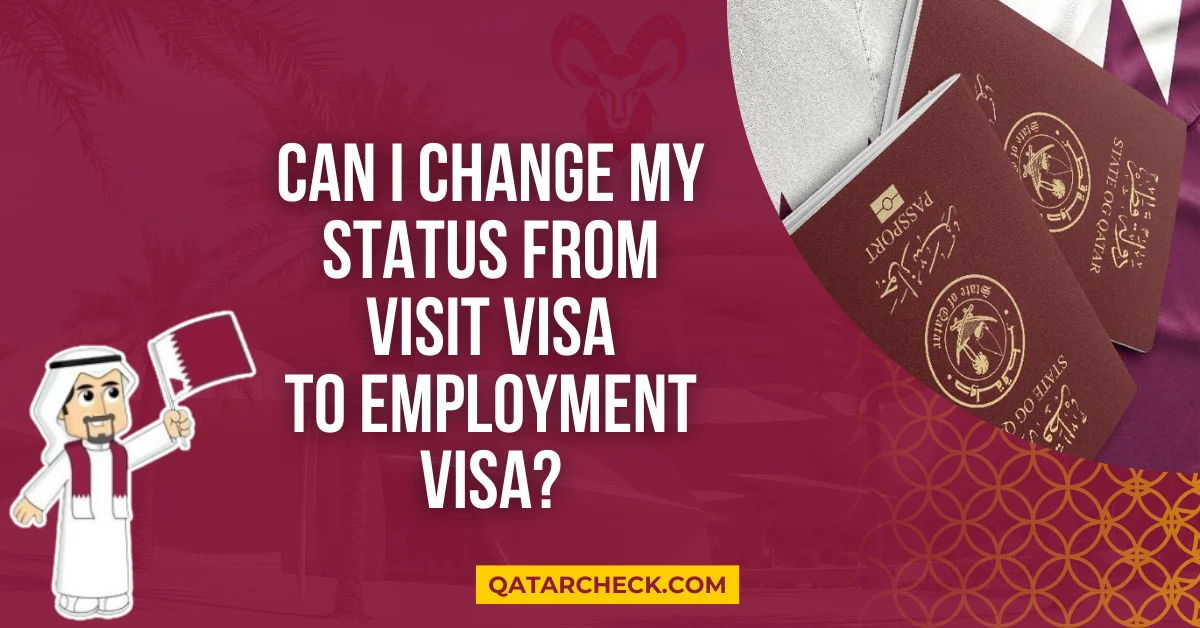Have you ever wondered if it’s possible to transition from a visit visa to an employment visa? If you’re in Qatar and considering this move, you’re not alone. Many people explore this option as they secure job opportunities while visiting.
The process may seem complex, but with the right steps and information, it’s manageable. Let’s break it down so you can understand how to make this switch while staying compliant with Qatar’s immigration laws.
Can I Change my Status from Visit Visa to Employment Visa? (Quick Answer)
Yes, you can change your status from a visit visa to an employment visa in Qatar. The process involves securing a job offer, completing medical tests, obtaining security clearance, and having your employer initiate the necessary visa applications, including an entry permit, work permit, and residence visa. Ensure compliance with all legal requirements.
Understanding Visa Categories in Qatar
Qatar has a structured visa system, with visit visas and employment visas being the most common. A visit visa is typically issued for tourism or visiting family and allows a temporary stay. In contrast, an employment visa is granted to those who secure a job in Qatar, enabling them to work legally. Understanding these categories is crucial before beginning the transition process.
Key Steps to Change from Visit Visa to Employment Visa
1. Obtain a Job Offer
Securing a job offer is the first and most important step. Without it, transitioning to an employment visa isn’t possible. Look for job opportunities that match your skills and qualifications. Once you receive a job offer, ensure you get an employment contract that outlines the terms and conditions of your job. This document will be essential for the next steps.
2. Undergo Medical Tests
The Qatari government mandates medical examinations for all expatriates applying for employment visas. These medical tests usually include a general health check, screenings for communicable diseases, and drug tests. Once completed, the test results are submitted as part of your visa application. This step ensures that you meet the health requirements to work in Qatar.
3. Security Clearance
In addition to medical tests, you’ll need to obtain a security clearance. This process involves background checks to confirm that you meet Qatar’s legal requirements for employment. Employers typically handle this step by submitting your personal details to the relevant authorities. Security clearance is a critical requirement and ensures your eligibility to work in the country.
4. Employer Initiates Visa Application
Once you’ve completed the medical tests and obtained security clearance, your employer will begin the visa application process. This involves applying for three key documents:
- Entry Permit: Allows entry to Qatar for employment purposes.
- Work Permit: Authorizes you to work legally in the country.
- Residence Visa: Grants you the right to reside in Qatar during your employment.
Your employer will liaise with the Ministry of Interior to manage these applications. Maintaining communication with your employer is crucial to ensure smooth progress.
5. Final Steps
After the employer receives approval for all necessary permits, you can finalize the transition. You may need to visit the Ministry of Interior to complete formalities for your residence visa. Ensure all documents are in order to avoid delays or complications.
Important Considerations
1. Validity of Visit Visa
Before beginning the transition, verify that your visit visa is still valid. If it expires during the process, you may face penalties or delays.
2. Legal Compliance
Adhering to Qatar’s immigration laws is non-negotiable. Ensure every step you take complies with local regulations to avoid legal issues.
3. Professional Guidance
If the process seems overwhelming, seek advice from immigration experts or legal professionals familiar with Qatar’s visa regulations. Their expertise can save you time and help avoid mistakes.
Conclusion
Transitioning from a visit visa to an employment visa in Qatar requires careful planning and execution. By securing a job offer, completing medical tests, obtaining security clearance, and coordinating with your employer for visa applications, you can successfully make this change. Always stay informed about the latest regulations and seek professional guidance when needed. This structured approach will help you navigate the process efficiently and achieve your employment goals in Qatar
Frequently Asked Questions
Q. Can I change my Visit Visa to an Employment visa while Staying in Qatar?
Yes, you can change your visit visa to an employment visa while staying in Qatar. You’ll need a job offer, medical clearance, security checks, and your employer to initiate the visa application process.
Q. How long does it take to transition from a Visit Visa to an Employment visa in Qatar?
The timeline can vary depending on factors like completing medical tests, security clearance, and processing the visa application. On average, the process may take a few weeks to a month.
Q. Who is responsible for applying for my Employment visa in Qatar?
Your employer is responsible for applying for your employment visa. They will handle the application for the entry permit, work permit, and residence visa after you fulfill the necessary requirements.
Q. What happens if my visit visa expires during the Transition process?
If your visit visa expires during the transition, you may face penalties or legal issues. Ensure your visit visa is valid before starting the transition process to avoid complications.
Q. Are there any specific documents needed to change my visa status in Qatar?
Yes, you’ll need documents such as your job offer letter, employment contract, valid passport, medical test results, and security clearance. Your employer will also need to submit applications for the required permits.

